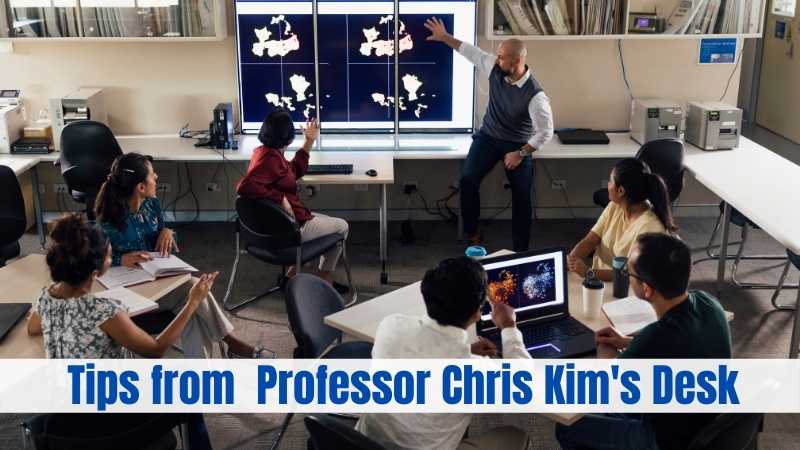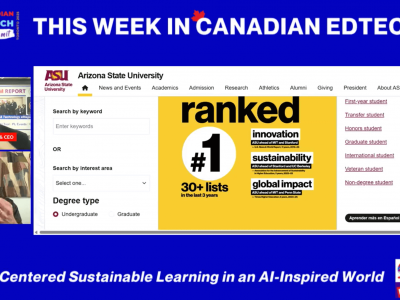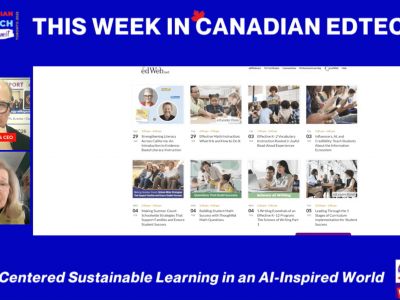While Toronto’s post-secondary students look forward to some form of near-normal summer in a city that seems to have its sights on reopening, many instructors and administrators are already gearing up to prepare for the uncertain Fall semester ahead.
As many universities and colleges across the province announce their strategies to gradually reopen their physical campuses come September, many instructors are left to wonder whether their expectations should remain consistent with the previous academic year, and what they can do to lead another semester with confidence. Having watched the remote learning sector evolve and grow over the better part of the decade, I now find myself offering some tips and words of advice (and perhaps comfort) to new and returning instructors, derived from my own experience on both sides of the podium. Below, I would like to share three keywords that served me well in the context of online learning.

Flexibility
During the 2020 lockdown, the Internet certainly felt more crowded than ever, undoubtedly with people moving their primarily physical businesses and practices to online. As many instructors were forced to move their lectures and tutorials online, I observed that many opted to simply transpose their classroom experiences to online platforms, often requiring all participants to keep their cameras and microphones online for the duration of each three-hour conference session.
While the goal of emulating a classroom environment is a commendable one, I wonder whether this approach serves our students well. Zoom fatigue is indeed real, and coupled with personal responsibilities, mental health hazards, and other sources of stress, our students could use every accommodation we can provide. Such an approach can also be met by infrastructural and accessibility challenges: some students simply may not have access to sufficient network bandwidth to participate in live conference sessions, and synchronous multi-party video calls often fail to provide the necessary accommodations to those with disabilities.
With our students currently scattered across the country (and even perhaps around the world), the ball is our court to keep the learning experience flexible and accessible. I suggest that we keep live conferences short and concise, and allow our students to asynchronously access our learning materials in the form of text-based articles and captioned video recordings. Instead of fixed virtual office hours, consider providing an online forum where students can asynchronously reach out for help (and help each other).
Scalability
In addition to various technical challenges introduced with a sudden shift to remote learning, instructors also faced extra pressure to handle more tasks and students with less institutional support as some staff members voluntarily or by design refrained from participating in the 20/21 academic year. While I personally embraced the challenge of reaching out to a larger cohort of students in the comfort of my home office, I recognize that this presented a monumental problem to many instructors with little time to prepare.
In smaller, synchronous classroom settings, repetition can be a useful tool to reinforce a certain concept, but they can be barriers to serving a large group of students at scale. Pop quizzes and unexpected breakout meetings may serve as incentives that keep students focused, but they can also be a debilitating factor for students who suffer from anxiety and panic (personally, I never loved them as an undergrad either), and slow down instructors as they tailor individual exercises that may not benefit from the same level of engagement.
I suggest all instructors firmly establish common methods of communication (ex. live conference, classwide announcements, and virtual office hour sign ups) early on, and stick to them. Thereafter, consider how one can reach as many students as possible with the least amount of effort or redundancy. Some strategies include maintaining a consolidated list of learning resources that students can easily access, or sending out weekly newsletters to all students under one’s supervision, addressing important talking points and upcoming deadlines. During these uncertain times where physical liaison is impossible, strong online communication policy inspires confidence and allows both parties to focus on what matters at the end of the day: education.
Humility
It is quite common for students to complain about less-than-friendly, perhaps even hostile email correspondence with their instructors (the feelings may be mutual vice versa), and such oppositions are compounded and exacerbated during these stressful times. Personally, I feel that there is never enough time to let personality clashes get in the way of producing good work or learning new concepts — and while my practice is very much technology-oriented, this COVID lockdown paradoxically trained me to connect with more students and colleagues on a deep, personal level.
I can still remember the wonder of connecting to the early Internet for the first time as a child, and publishing client-commissioned websites still excites me as an active practitioner. In industry-oriented academic programs, it is important for us to recognize that we are often representatives of the very industry that our students are looking to break into: they look to us for our guidance as subject experts, but also our own anecdotes and stories as once starry eyed enthusiasts.
Identifying potential vulnerabilities that a novice may feel about the subject and sharing one’s own story addressing those concerns are useful for establishing and maintaining rapport with the students. Instructors, albeit in a position of authority, should strive to make such a power structure invisible and irrelevant: instead, we can take a position of a proud champion, and an effusive ambassador of the domain that we respect and admire.
In closing
These are some of the things I often tell other incoming instructors when they come to me for advice. Although these strategies may not be directly compatible with your course, they certainly worked for me, with or without the pandemic: I hope they at least give you some perspective on how one can approach this unusual challenge looming on the horizon.
—
Chris Kim
https://chriskkim.com
https://www.linkedin.com/in/chriskkim










